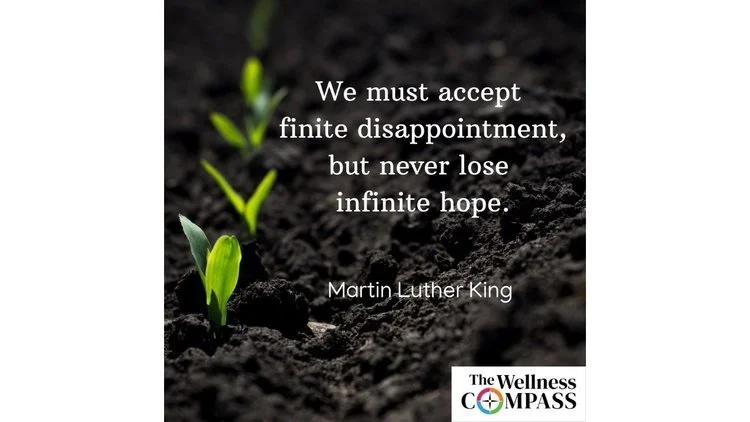Let Your Life Speak: Listening to Our Souls
Most nonprofit organizations have mission statements. These statements succinctly state the purpose of the organization in order to inform and guide those who work for or support the organization.
Here are a few such statements from some organizations you might know:
"The American Red Cross prevents and alleviates human suffering in the face of emergencies by mobilizing the power of volunteers and the generosity of donors."
"The mission of the American Cancer Society is to improve the lives of people with cancer and their families through advocacy, research, and patient support, to ensure everyone has an opportunity to prevent, detect, treat, and survive cancer."
"Feeding America's mission is to advance change in America by ensuring equitable access to nutritious food for all in partnership with food banks, policymakers, supporters, and the communities we serve."
Our Wellness Compass Initiative is a nonprofit program, so we also have a mission statement. "The Wellness Compass Initiative is a nonprofit with a mission to enhance mental health and resilience in individuals, families, schools, organizations, and communities."
Today's column is our fourth in a series on "Let Your Life Speak." This week we focus on spirituality and listening to our souls as they relate to our core beliefs and values. It is our response to the question, "What's your why?" A person’s why may be expressed through our spirituality in religious beliefs or practices, or it may be expressed in a manner that is separate from a formal religious tradition.
An individual's spirituality is like a nonprofit organization's mission statement. If you were to write a mission statement for your life, it would be an expression of your spiritual beliefs. To use the metaphor of a compass, spirituality is our true north.
Just as mission statements help organizations know what to say yes to and what to say no to, our core values and beliefs do the same for us as individuals. When we say yes to things that do not align with our spirituality, we will eventually find a sense of unease as our souls speak to us, letting us know we are getting off course.
Our souls contain deep wisdom. We are wise to listen to them, especially when they let us know that we are veering away from our sense of true north.
Making It Personal:
If you were to write a personal mission statement, what would it be?
Might you be willing to try doing so?
How do you recognize when you are getting out of alignment with your spiritual values and beliefs, and what helps you to get back on course?****************************************************************************************************************
To explore your own well-being in the eight areas of wellness, you may be interested in downloading our newest FREE resource, The Adult Wellness Compass Notebook. This workbook is perfect for either individual or group use, and is a tool for self-reflection, learning, and goal setting. Click HERE to download and enjoy.
Each week Holly and Scott Stoner record the Wellness Compass Podcast. Each episode is about 15 minutes and offers a deeper dive into what appears here in the written column. You can listen to the Wellness Compass podcast in your favorite podcast app—just search for “The Wellness Compass,” and you can listen by clicking HERE and scrolling down to this week’s episode.
And speaking of podcasts, Scott has launched a new podcast this week that is just him speaking about a topic that he is passionate about—the integration of spirituality and wellness. You can listen to the newly launched Living Compass podcast by clicking on the word “Podcast” in the bar at the top of this Living Compass webpage or find it in your favorite podcast app (Apple, Google, Spotify, etc.)
Subscribe Now to Weekly Words of Wellness:
Click the button below to signup for the e-mail version of Weekly Words of Wellness. This weekly article can be shared with your community electronically and/or used for group discussion.
You can unsubscribe at any time.




